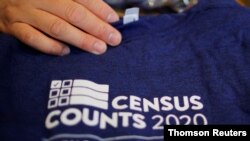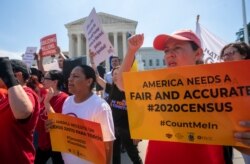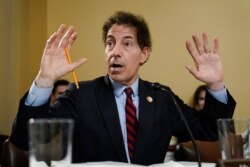This story was updated 8:33 AM.
U.S. federal courts and states that challenged the Trump administration's decision to include a citizenship question on the country's 2020 census are asking for clarity after the Departments of Justice and Commerce suddenly reversed what had been an acceptance of finalizing the questionnaire without inquiring about citizenship status.
The Supreme Court has already ruled that the government's reasoning for including the citizenship question did not meet standards for a clear explanation of why it should be asked during the count of people in the United States that takes place every ten years.
The matter seemed further settled on Tuesday when the DOJ and Commerce Department made public statements and comments in legal cases that the process of printing the census was going forward without a citizenship question in order to meet deadlines for carrying out the count on time.
But with a series of tweets President Donald Trump injected uncertainty back into the process as he proclaimed, "We are absolutely moving forward, as we must, because of the importance of the answer to this question."
At the start of the country's annual Independence Day holiday, Trump tweeted that Commerce and Justice department officials "are working very hard on this, even on the 4th of July!"
Friday hearing
U.S. District Judge George Hazel of Maryland has set a deadline of 2 p.m. Friday for the government to either say the citizenship question will not appear on the census, or to explain how the court should proceed with an unresolved challenge that the government violated the equal protection clause of the U.S. Constitution.
So far, rulings have focused on the administrative process and whether Commerce Secretary Wilbur Ross acted reasonably in pursuing his agency's goals. An examination of equal protection challenges would bring into the case whether the administration sought to suppress the count of minorities in the census.
Trump's Democratic opponents have claimed that including the citizenship question is a Republican ploy to scare immigrants into not participating in the census out of fear that immigration officials might target them for deportation when they determine that they are in the country illegally. An undercount in Democrat-leaning areas with large immigrant and Latino populations could reduce congressional representation for such states and cut federal aid.
The attorneys general of California and New York have asked federal courts in those states to hold conferences Friday so that the Justice Department can make its positions clear after what has happened in the Maryland District Court and with the changing statements from the Trump administration.
What's going on
In the conference call with the Maryland court on Wednesday, Justice Department special counsel Joshua Gardner admitted that they were still sorting out how to respond to Trump's statements.
"The tweet this morning was the first I had heard of the president's position on this issue, just like the plaintiffs and your honor," Gardner said. "I do not have a deeper understanding of what that means at this juncture, other than what the president has tweeted. But, obviously, as you can imagine, I am doing my absolute best to figure out what's going on."
However, Gardner added that the Census Bureau has not stopped its current process of printing the census without a citizenship question, as the government continues to weigh what options it may have.
The Census Bureau had previously set a target date of early July to begin printing the questionnaire in order to have it prepared for delivery to the American public by the April 1 deadline.
The census is important because it determines how many seats in the House of Representatives each state is allotted and how $800 billion in federal aid is disbursed.
After the Supreme Court heard arguments on the citizenship question but before it ruled, documents emerged from the files of a deceased Republican election districting expert showing that the citizenship question was aimed at helping Republicans gain an electoral edge over Democrats.
Congressional hearing
Rep. Jamie Raskin, the Chairman of the Subcommittee on Civil Rights and Civil Liberties at the House Oversight Committee, announced Wednesday that the director of the U.S. Census Bureau, Steven Dillingham, will testify at a hearing on July 24 on the status of planning and preparations for the 2020 Census.
"It is time for the Census Bureau to move beyond all the outside political agendas and distractions and devote its full attention to preparing for the 2020 Census," said Raskin, a Maryland Democrat. "This hearing will examine the current status of the bureau’s readiness for the census next year -- especially in areas where the bureau may be falling behind such as IT, security and public education."








